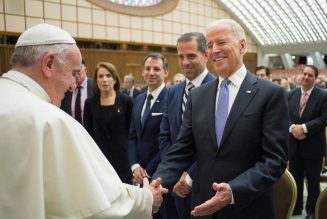 |
“Children are the future of the Church.” How often are such truisms used to explain the extensive focus on a single demographic group within a parish? From youth ministry to religious education to Catholic schools, most Catholic parishes direct a large amount of their limited resources toward young people. After all, if our children fall away, the future of the Church will be dire indeed.
Of course, the future of the Church is dire, demographically speaking. In spite of all this focus on young people, we see them flocking for the door once they reach adulthood. The problem isn’t bad or incompetent youth ministers; I’ve known many good and sincere Catholics involved in youth outreach, who work long hours and are committed to bringing kids to Christ. Yet, to repeat, it’s not working. Once free from their parents’ direct influence, kids are leaving the Church.
So, if the problem isn’t a lack of focus or competent and sincere leaders, then what is it? I would argue that our model for reaching young people is fatally flawed.
I know that even suggesting that our current model of youth ministry is flawed will raise the hackles of the Catholic professional class, in spite of the current model’s evident failure. For some reason, youth ministry is a sacred cow. However, we can’t avoid the grim reality of millions of Catholics growing up and then moving out, even after having been involved in “good” youth ministry. Surely many youth programs are orthodox and very well-intentioned. This is my point. So why are young people still leaving? And how can we change this?
Finding the answer starts with looking at which factors influence a person’s decision to remain Catholic after the teenage years. The biggest influence on them is the parents. As a recent study by the Pew Research Center noted,
Among those who were raised in a single religious background…the family’s religious commitment is closely linked with retaining one’s religion into adulthood. Those adults who say religion was very important to their family while growing up and whose parents frequently discussed religion are more likely than others to continue to identify with their parents’ religion as adults.
For Catholics, if religion was “very important” in the family, then 73 percent of the time the kids remained Catholic after leaving the house. If it was “not too/not at all important,” only 38 percent remained Catholic. This shouldn’t be surprising to most people involved with youth outreach; they know it from experience. This is why many look for ways to involve parents in their youth activities. However, the model remains directed toward the kids, separate from their parents.
Research also points to the vital role specifically of the father’s faith. A 2000 report in Population Studies magazine concluded that “it is the religious practice of the father of the family that, above all, determines the future attendance at or absence from church of the children.” More specifically, it states:
In short, if a father does not go to church—no matter how faithful his wife’s devotions—only one child in 50 will become a regular worshipper. If a father does go regularly, regardless of the practice of the mother, between two-thirds and three-quarters of their children will become churchgoers (regular and irregular).
Only 2 percent of kids whose fathers don’t practice the faith will end up practicing that faith! It’s clear, then, that fathers more than anyone dramatically impact their children’s future religious practice, and if parishes want children to retain their faith in adulthood (which is the purpose of youth ministry), they should focus not on the children but on the fathers.
Even with data supporting this conclusion, it still seems counterintuitive that to reach kids we shouldn’t focus on them but on their fathers instead. Yet this is the biblical method of salvation.
In the Bible, whenever God works with a group of people, He does not direct His energies toward the entire group, but toward a mediator. Think of Abraham, Moses, or David: each of these men represented a much larger group of people. God first influenced and converted the one man, then He allowed that individual to influence the group he led and represented. This is also the fundamental way in which the Catholic Church operates: we have bishops and priests who receive specific graces and powers that are then used to help the laity draw closer to Christ.
The father is the “mediator”—the “priest”—of the family, the domestic church. Therefore it makes sense, both sociologically and theologically, to focus on fathers in order to save the children.
❧
How can we do this? What practical steps can a parish take to influence fathers? Many people might suggest the typical answers, such as a men’s Bible study group or a strong Knights of Columbus council. However, these things, while they can be beneficial, aren’t enough. They may support men already strong in their faith, but they don’t impart the faith or make it attractive to men. If we are going to attract and hold the attention of fathers of young children, parishes will need to make more radical changes. These will be highly controversial, but we need to ask ourselves: do we want to succeed in passing on the faith to future generations, or are we more concerned with maintaining the status quo?
The primary thing that needs to be done is to destroy the current ambiance found in most parishes, which is only attractive to gay men of the 1970s. Merely entering a typical suburban Catholic parish is emasculating, from the architecture to the music to the felt banners to the limp homily to the army of elderly female Eucharistic ministers. What red-blooded male would be interested in that if he did not already have a faith strong enough to see beyond it to the underlying reality? Parishes are sending a strong message without even realizing it: young virile men are not welcome.
What can be done to change this? Here are seven suggestions (with thanks to John Zmirak, who suggested a couple of them to me):
1) Institute ad orientem worship. Men would prefer following a leader into battle to sitting around a table for a chat. When a priest leads his people in worship, not only in spirit, but in his body’s orientation, he challenges men to follow him, and men love that challenge.
2) Ensure there are only men and boys at the altar. In many parishes, there is only one man at the altar during Mass: the priest. The altar servers are all girls, and the Eucharistic ministers are female as well. Men are not naturally inclined to follow women, though women will follow men. The visual of hordes of women at the altar sends an unwelcoming and effeminate message to most men.
3) Maintain silence before and after Mass in the church. Walking into a Catholic church full of the sound of people chattering away before Mass sends a signal that people there don’t take the Mass seriously. Men want a faith that is serious above all else. They are not looking for a social club; they are looking for something to give their life to. Well-dressed male ushers should politely remind those who do talk before or after Mass to stop.
4) Sing traditional hymns, not the 1970s folk drivel so popular today. Men want to hear songs that are beautiful and inspire them to greater heights, not a thousand and one variations of kum-ba-yah.
5) Institute men’s groups (i.e. the Holy Name Society) that focus on concrete, practical activities. Most men don’t want to sit around in a group and share their feelings about a Bible passage. They want to do things. So have a men’s group that does service projects, such as working at a soup kitchen, praying in front of Planned Parenthood, or building a grotto on the parish grounds. Such a group should be chaplained by the pastor, who connects their actions with their spirituality as Catholic men.
6) Call for sacrifice. Men don’t want to hear “just be nice” week in and week out. They want to be challenged to go deeper in the faith, with practical and concrete challenges. So call them to make real sacrifices, such as fasting on Fridays or taking cold showers in reparation for sin or for the salvation of souls.
7) Tell it like it is. Stop mincing words. Confront the anti-Catholic secularism that’s overtaking our culture, and directly address the crisis in the Church. Pretending there isn’t rampant corruption at the highest levels of the Church only makes one look like a cowardly sycophant, not a courageous disciple of Christ that men will be willing to follow.
If we want the faith to survive tomorrow, it’s imperative that we reach out to fathers today. This won’t be easy. Parishes must change their entire mindset when it comes to helping young people, redirecting their focus from youth outreach to bringing fathers back to the faith. Only then will the next generation have a chance. If we save the father, we will save the youth, and save the future of the Church.
Image: “Seminarians in Barcelona circa 1900 in Cassock, Greca & Saturno” via the Brighton Oratory








